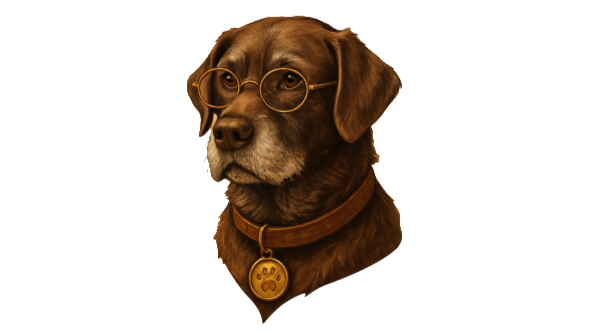
Common Health Issues in Senior Labradors (& How to Help)
As Labrador Retrievers age, their bodies change — just like ours. These lovable, loyal companions are prone to several health challenges in their senior years. Understanding common senior Labrador health problems and knowing how to address them can significantly improve your dog's quality of life. This comprehensive guide covers the most frequent health issues affecting older Labs and provides practical solutions to help your senior Labrador live comfortably and happily.
When Do Labrador Retrievers Become Seniors?
Most Labrador Retrievers are considered senior dogs between 7-8 years old, though this can vary based on size, genetics, and overall health. Larger Labs may show signs of aging earlier than smaller ones. Recognizing the transition to senior status helps you adjust care routines and watch for age-related health changes.
🦴 Arthritis & Joint Pain in Senior Labradors
Labradors are highly prone to hip and elbow dysplasia, making arthritis one of the most common senior Labrador health issues. Studies show that over 70% of senior Labs develop some form of arthritis or joint disease.
Signs of Arthritis in Senior Labs:
- Difficulty standing after lying down
- Hesitation when climbing stairs or jumping into cars
- Limping or favoring one leg
- Slow, stiff walks, especially in cold weather
- Reluctance to play or engage in physical activities
- Whimpering or showing discomfort when touched
How to Help Your Arthritic Senior Labrador:
- Orthopedic dog beds: Provide memory foam or orthopedic beds that support joints and reduce pressure points
- Joint supplements: Try supplements with glucosamine, chondroitin, and MSM to support cartilage health
- Weight management: Keep your Lab at a healthy weight to reduce stress on joints
- Physical therapy: Consider canine physical therapy or hydrotherapy
- Gentle exercise: Maintain regular, low-impact activities like swimming or short walks
- Pain management: Work with your veterinarian to develop an appropriate pain management plan
🧠 Cognitive Decline (Canine Dementia) in Aging Labradors
Older Labradors can develop Canine Cognitive Dysfunction (CCD), which resembles Alzheimer's disease in humans. Approximately 14-35% of senior dogs show signs of cognitive decline, with the percentage increasing with age.
Symptoms of Canine Cognitive Dysfunction:
- Disorientation or staring blankly at walls
- Confusion about familiar surroundings
- Trouble recognizing familiar people, pets, or routines
- Changes in sleep patterns, including pacing or restlessness at night
- Increased anxiety or clinginess
- Accidents in the house despite being house-trained
- Decreased interest in activities they once enjoyed
Supporting a Senior Lab with Cognitive Decline:
- Maintain routine: Keep a predictable daily schedule for feeding, walks, and activities
- Mental stimulation: Use brain puzzle toys and interactive feeders to keep the mind active
- Supplements: Try supplements with omega-3 fatty acids, B-vitamins, or antioxidants like vitamin E
- Environmental enrichment: Provide new scents, textures, and gentle challenges
- Consistent commands: Use simple, consistent verbal cues and hand signals
- Night lights: Install night lights to help with navigation in the dark
⚖️ Weight Gain and Obesity in Senior Labradors
Senior Labs often become less active while maintaining their legendary appetites, putting them at significant risk for obesity. Overweight senior dogs face numerous health complications that can dramatically impact their quality of life and longevity.
Health Risks of Obesity in Senior Labs:
- Type 2 diabetes: Excess weight increases insulin resistance
- Worsening arthritis: Extra pounds put additional stress on already compromised joints
- Heart disease: Obesity strains the cardiovascular system
- Reduced lifespan: Overweight dogs typically live 1-2 years less than their healthy-weight counterparts
- Breathing difficulties: Excess weight can compress airways
- Increased cancer risk: Obesity is linked to higher cancer rates
Managing Weight in Senior Labradors:
- Senior-specific dog food: Feed a high-quality senior-specific formula with appropriate protein and reduced calories
- Portion control: Measure food portions carefully and follow feeding guidelines
- Healthy treats: Replace high-calorie treats with vegetables like carrots or green beans
- Regular exercise: Encourage daily walks and light activity appropriate for your dog's mobility level
- Multiple small meals: Consider feeding smaller, more frequent meals to boost metabolism
- Regular weigh-ins: Monitor weight monthly and adjust portions as needed
❤️ Heart Disease in Senior Labradors
Cardiovascular problems become more common as Labradors age. Some senior Labs develop congestive heart failure, heart murmurs, or arrhythmias. Early detection and proper management are crucial for maintaining quality of life.
Signs of Heart Disease in Senior Labs:
- Persistent coughing, especially at night or after exercise
- Shortness of breath or rapid breathing
- Unexplained fatigue or weakness
- Fainting or collapse episodes
- Reduced exercise tolerance
- Restlessness or difficulty sleeping
- Swollen abdomen or legs
Managing Heart Disease in Senior Labrador Retrievers:
- Veterinary care: Regular cardiac checkups and monitoring
- Medication compliance: Administer prescribed heart medications consistently
- Low-sodium diets: Reduce sodium intake to decrease fluid retention
- Heart-supporting supplements: Consider CoQ10, taurine, or L-carnitine supplements
- Gentle exercise: Maintain appropriate activity levels as recommended by your vet
- Stress reduction: Minimize anxiety and stress in your dog's environment
🧪 Kidney Disease in Senior Labradors
Chronic kidney disease affects approximately 10% of senior dogs and can significantly impact their health if left untreated. Early detection and management are essential for slowing disease progression.
Early Signs of Kidney Disease:
- Increased thirst and urination
- Decreased appetite
- Vomiting or nausea
- Weight loss despite normal eating
- Lethargy or reduced activity
- Dull, dry coat
- Bad breath with a chemical odor
- Pale gums
Supporting a Senior Lab with Kidney Disease:
- Hydration: Ensure constant access to fresh water and encourage drinking
- Kidney-supportive diets: Feed prescription renal diets with reduced phosphorus and protein
- Supplements: Discuss renal supplements like omega-3s or phosphate binders with your vet
- Regular monitoring: Schedule frequent blood work to track kidney function
- Medication management: Follow prescribed treatments for blood pressure or nausea
- Environmental modifications: Provide easy access to water bowls and frequent potty breaks
👁️ Vision and Hearing Changes in Senior Labradors
Many senior Labradors experience gradual vision and hearing loss, which can affect their confidence and behavior.
Common Age-Related Changes:
- Cataracts: Cloudy lenses that can impair vision
- Nuclear sclerosis: Natural lens hardening that may affect focus
- Hearing loss: Gradual reduction in hearing sensitivity
- Night blindness: Difficulty seeing in low-light conditions
Helping Labs with Sensory Changes:
- Consistent environment: Avoid rearranging furniture or changing routines
- Verbal cues: Use voice commands for dogs with vision problems
- Hand signals: Develop hand signals for dogs with hearing loss
- Safety measures: Block access to stairs or pools if vision is compromised
- Patience: Allow extra time for your dog to process and respond to cues
🦷 Dental Health in Senior Labradors
Dental disease becomes increasingly common in senior dogs and can lead to serious health complications if left untreated.
Signs of Dental Problems:
- Bad breath
- Yellow or brown tartar buildup
- Red, swollen gums
- Difficulty eating or chewing
- Dropping food while eating
- Pawing at the mouth
Maintaining Senior Lab Dental Health:
- Regular dental cleanings: Schedule professional cleanings as recommended by your vet
- Daily brushing: Brush teeth daily with dog-safe toothpaste
- Dental treats: Provide dental chews or toys designed to reduce plaque
- Diet considerations: Consider dental-specific foods that help clean teeth
- Regular monitoring: Check your dog's mouth regularly for changes
🩺 Regular Veterinary Care for Senior Labradors
Senior Labradors benefit from more frequent veterinary visits to catch health issues early and manage existing conditions effectively.
Recommended Senior Dog Checkups:
- Bi-annual exams: Visit your vet every 6 months instead of annually
- Complete blood panels: Annual or bi-annual blood work to check organ function
- Urinalysis: Regular urine testing to monitor kidney health
- Blood pressure checks: Monitor for hypertension
- Parasite prevention: Continue flea, tick, and heartworm prevention
- Vaccination updates: Maintain appropriate vaccination schedules
💡 Creating a Comfortable Environment for Your Senior Labrador
Making your home senior-dog-friendly can significantly improve your aging Lab's comfort and mobility.
Home Modifications for Senior Labs:
- Non-slip surfaces: Add rugs or mats on slippery floors
- Raised food bowls: Reduce neck strain during eating
- Ramps: Install ramps for easier access to cars, beds, or furniture
- Comfortable bedding: Provide orthopedic beds in multiple locations
- Easy bathroom access: Ensure quick access to outdoor potty areas
- Temperature control: Maintain comfortable temperatures as seniors are more sensitive to extremes
🏃♂️ Exercise and Activity for Senior Labradors
While senior Labs may not have the energy of their younger years, regular exercise remains crucial for maintaining physical and mental health.
Appropriate Exercise for Senior Labs:
- Daily walks: Continue daily walks but adjust pace and distance
- Swimming: Low-impact water exercise is excellent for arthritic joints
- Mental stimulation: Use puzzle toys and training sessions to keep minds sharp
- Gentle play: Encourage light play sessions with favorite toys
- Consistency: Maintain regular exercise schedules to support routine
🍎 Nutrition for Senior Labradors
Proper nutrition becomes even more critical as Labradors age, helping support organ function and maintain optimal health.
Senior Lab Nutritional Needs:
- High-quality protein: Maintain muscle mass with easily digestible proteins
- Controlled calories: Adjust portions to prevent weight gain
- Joint-supporting nutrients: Look for foods with glucosamine and chondroitin
- Antioxidants: Choose foods rich in vitamins E and C to support immune function
- Omega-3 fatty acids: Support brain health and reduce inflammation
🏥 When to Seek Emergency Veterinary Care
Knowing when to seek immediate veterinary attention can be life-saving for senior Labradors.
Emergency Warning Signs:
- Difficulty breathing or labored breathing
- Sudden collapse or inability to stand
- Seizures or tremors
- Prolonged vomiting or diarrhea
- Signs of severe pain
- Bloated or distended abdomen
- Inability to urinate or defecate
💡 Final Tip: Prevention Is the Best Medicine
Your senior Lab deserves a comfortable, healthy life. Many age-related health issues can be managed or even prevented with proactive care. The key to successful senior dog care lies in early detection, consistent management, and adapting your approach as your dog's needs change.
Essential Elements of Senior Lab Care:
- Regular veterinary checkups: Bi-annual exams and diagnostic testing
- Quality nutrition: Age-appropriate diets and beneficial supplements
- Consistent routines: Predictable schedules that provide security
- Appropriate exercise: Regular, low-impact activities
- Environmental modifications: Home adjustments for comfort and safety
- Loving patience: Understanding that aging brings changes in behavior and needs
Remember, every senior Labrador is unique, and what works for one dog may not work for another. Work closely with your veterinarian to develop a personalized care plan that addresses your specific dog's needs and helps them enjoy their golden years to the fullest.
By staying informed about common senior Labrador health issues and implementing preventive care strategies, you can help your beloved companion maintain the best possible quality of life throughout their senior years. With proper care, attention, and love, your senior Lab can continue to be the loyal, happy companion you've always cherished.
📸 Photo Credits: Featured images in this article are licensed from Shutterstock



